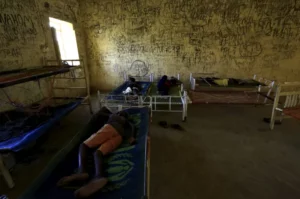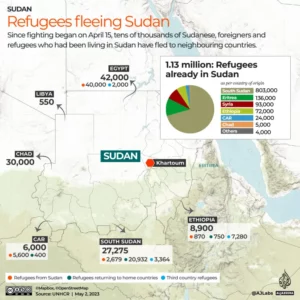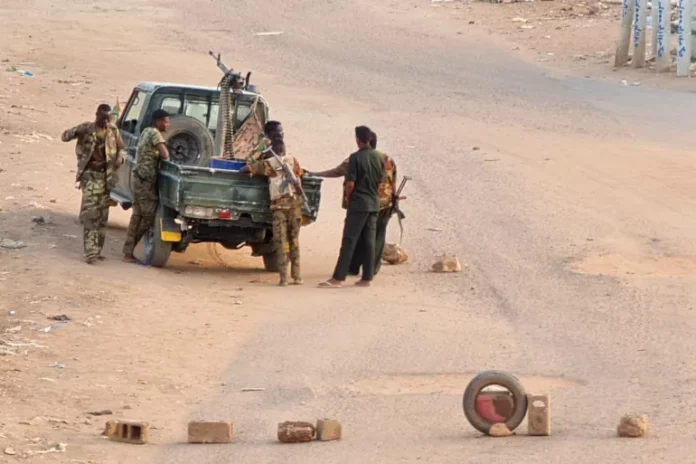Some Eritreans are reportedly missing in Sudan, raising fears of kidnappings by Eritrean authorities or traffickers
Bilal Hashem last heard from his friend, a fellow Eritrean, on April 19 in Kassala, a city in eastern Sudan near the Eritrean border. He was fleeing Sudan’s war-torn capital, Khartoum, to a refugee camp and to access aid from the United Nations.
Then Hashem received an anxious call from his friend. “He said, ‘They grabbed me and took me off the bus.’ The line was then cut off,” Hashem, 26, told Al Jazeera from Sudan.
I never look at other people’s work. I can’t get sucked into that celebrity thing, because I think it’s just crass. Give me time and I’ll give you a revolution. I can’t get sucked into that celebrity thing, because I think it’s just crass.
I can design a collection in a day and I always do, cause I’ve always got a load of Italians on my back, moaning that it’s late. Sometimes the simplest things are the most profound.
“If he was in a refugee camp, then I would have heard news from him. But he’s not there.”
Hashem’s friend could be among a number of Eritreans who have reportedly disappeared on the road to Kassala, raising fears that they have either been captured by Eritrea’s authoritarian government or by human traffickers after fleeing the fighting between the Sudanese army and the paramilitary Rapid Support Forces (RSF).
Three Eritrean refugees told Al Jazeera that they lost contact with friends after their bus entered Kassala on April 19, May 1 and May 15. All have asked peers to search for them in refugee camps, but none has been found.

There are an estimated 126,000 Eritrean refugees in Sudan, according to UN data, struggling to survive the conflict. They comprise 11 percent of the 1.1 million refugees in the country.
With the UN refugee agency (UNHCR) confining its assistance to Eritreans in camps in Kassala, many are being forced to choose between accessing aid in an area where they risked being kidnapped or relocating where help is not available.
“We are doing the best we can to work in the conditions that are prevailing in the country. I can’t speculate [about returns to Eritrea] because we have no confirmation of forced returns,” said Faith Kasina, a UNHCR spokesperson.
Vanessa Tsehaye, the executive director of One Day Seyoum, which advocates on behalf of Eritrean refugees worldwide, said, “There are different reasons why UNHCR should reconsider its response to the crisis. Obviously, we have the geographic location [of the camps,] which is not ideal considering the allegations of forced returns to Eritrea and that should be taken seriously.”
“If [UNHCR] doesn’t have confirmation that this is happening, then why risk [the safety of Eritreans] … if there is another chance of putting them elsewhere,” she added.
Dangerous precedent
The well-known dangers in Kassala have pushed many Eritreans to settle elsewhere across the country after fleeing the fighting in Khartoum.
Samir Tesfay, a 28-year-old Eritrean who was born in Sudan, said that he and his family came to Gadarif, another city in eastern Sudan near the border with Ethiopia. He contemplated heading to Kassala because of the cheaper rent and what he claimed was better access to UN aid, but he changed his mind after losing contact with an acquaintance on May 1.
“He’s a friend of a friend, but we were in contact because I wanted to know the situation in Kassala. But his phone suddenly shut off and I haven’t heard any news from him for three weeks,” Tesfay said.
Tesfay added that he was struggling to pay rent and feed his family and that he has not had any luck finding work. If the war drags on, he intended to cross the border to Ethiopia and take refuge there.
“All young [Eritreans] are afraid to go back to Eritrea. That’s why we are all going to Addis [Ababa],” he said, referring to Ethiopia’s capital.
Eritrean refugees have long been unsafe in Sudan because of the close security and political ties between the two countries.
In 2014, UNHCR reported that 14 Eritrean asylum seekers were abducted in Kassala state after armed men intercepted a truck that was transporting them to a refugee camp. Six of them were unaccompanied minors.
In May, the UN said that refugees who had left camps in the east to work as labourers on farms have been kidnapped, triggering anxiety among Ethiopian and Eritrean asylum seekers who are struggling to find part-time work.
“It’s not just the Eritrean government. There have been kidnappings from these camps for a very long time,” Tsehaye told Al Jazeera. “Ransoms can go up to thousands of dollars. [Eritreans] are at risk and they don’t have enough protection at these camps.”

The well-known dangers in Kassala have pushed many Eritreans to settle elsewhere across the country after fleeing the fighting in Khartoum.
Samir Tesfay, a 28-year-old Eritrean who was born in Sudan, said that he and his family came to Gadarif, another city in eastern Sudan near the border with Ethiopia. He contemplated heading to Kassala because of the cheaper rent and what he claimed was better access to UN aid, but he changed his mind after losing contact with an acquaintance on May 1.
“He’s a friend of a friend, but we were in contact because I wanted to know the situation in Kassala. But his phone suddenly shut off and I haven’t heard any news from him for three weeks,” Tesfay said.
Tesfay added that he was struggling to pay rent and feed his family and that he has not had any luck finding work. If the war drags on, he intended to cross the border to Ethiopia and take refuge there.
“All young [Eritreans] are afraid to go back to Eritrea. That’s why we are all going to Addis [Ababa],” he said, referring to Ethiopia’s capital.
Who’s involved?
One Sudanese-Eritrean man, who requested anonymity due to fear of reprisal, claimed that Sudanese army troops may be implicated in forced returns. On April 24, he boarded a bus from Khartoum to Kassala, but told Al Jazeera that the vehicle was stopped apparently by officers in civilian and military clothes.
According to the man, the officers asked all the Sudanese nationals to exit the bus and then allegedly began threatening the refugees still on board with deportation unless they paid bribes between $100-200.
The night before, his relatives were on another bus that was also stopped while passing through east Sudan. They told him that Eritrean refugees were scared of being forcefully returned, so they managed to get out of the vehicle and flee in the middle of the night.
“From all the conversations that [passengers] were having with these officers, it seems that they just wanted money,” he said.



